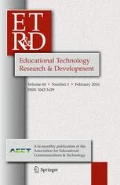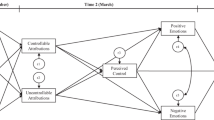Abstract
This study investigated how gender and beliefs about ability moderate the effects of attributional praise feedback on college students’ task motivation and performance in an online environment. We conducted a 3 (praise type: ability vs. effort vs. none) × 2 (gender: male vs. female) × 2 (belief about ability: entity vs. incremental) between-subjects factorial experiment with 196 college students. Analysis of variance of the data detected significant interactions between praise and gender on the main outcome variables. Overall, praise feedback had significantly positive impact on male participants’ task performance, self-efficacy, and intrinsic motivation; whereas for female participants, praise feedback had no significant effects on these variables. Additionally, there is a trend (albeit non-significant) interaction between praise type and belief type on task effort, indicating that for entity-belief group, ability praise feedback tended to positively influence task effort whereas for incremental-belief group, effort praise feedback tended to positively impact task effort. Implications of these findings for theory and practice are discussed.





Similar content being viewed by others
References
Allen, I. E., & Seaman, J. (2013). Changing course: ten years of tracking online education in the United States. BABSON Survey Research Group. Babson Park, MA: Babson Survey Research Group and Quahog Research Group, LLC.
Allen, I. E., Seaman, J., Poulin, R., & Straut, T. T. (2016). Online report card: Tracking online education in the United States. Sloan Consortium, 1–4. Retrieved January 20, 2019 from http://onlinelearningsurvey.com/reports/onlinereportcard.pdf.
Bandura, A. (2006). Guide for constructing self-efficacy scales. In F. Pajares & T. Urdan (Eds.), Self-efficacy beliefs of adolescents (pp. 307–337). Greenwich, CT: Information Age Publishing.
Baylor, A. L., Shen, E., & Huang, X. (2003). Which pedagogical agent do learners choose? The effects of gender and ethnicity. In World Conference on E-Learning in Corporate, Government, Healthcare, and Higher Education (pp. 1507–1510).
Brummelman, E., Thomaes, S., Overbeek, G., Orobio de Castro, B., van den Hout, M. A., & Bushman, B. J. (2014). On feeding those hungry for praise: Person praise backfires in children with low self-esteem. Journal of Experimental Psychology,143(1), 9–14. https://doi.org/10.1037/a0031917.
Cimpian, A., Arce, H. M. C., Markman, E. M., & Dweck, C. S. (2007). Subtle linguistic cues affect children’s motivation. Psychological Science,18(4), 314–316. https://doi.org/10.1111/j.1467-9280.2007.01896.x.
Corpus, J. H., & Lepper, M. R. (2007). The effects of person versus performance praise on children’s motivation: gender and age as moderating factors. Educational Psychology,27(4), 487–508. https://doi.org/10.1080/01443410601159852.
Dabbagh, N. (2007). The online learner: Characteristics and pedagogical implications. Contemporary Issues in Technology and Teacher Education,7(3), 217–226.
Deci, E. L. (1972). Intrinsic motivation, extrinsic reinforcement, and inequity. Journal of Personality and Social Psychology,22, 113–120.
Deci, E. L., Cascio, W. E., & Krusell, J. (1975). Cognitive evaluation theory and some comments on the Calder and Staw critique. Journal of Personality and Social Psychology,31, 81–85.
Dille, B., & Mezack, M. (1991). Identifying predictors of high risk among community college telecourse students. American Journal of Distance Education,5(1), 24–35. https://doi.org/10.1080/08923649109526729.
Dweck, C. S. (2000). Self-theories: their role in motivation, personality, and development. Philadelphia, PA: Taylor & Francis.
Dweck, C. S. (2006). Is math a gift? Beliefs that put females at risk. In S. J. Ceci & W. Williams (Eds.), Why aren’t more women in science? Top researchers debate the evidence (pp. 47–55). Washington, DC: American Psychological Association. https://doi.org/10.1037/11546-004.
Dweck, C. S. (2008). Mindsets: How praise is harming youth and what can be done about it. School Library Media Activities Monthly,24(5), 55–58.
Dweck, C. S., & Leggett, E. L. (1988). A social-cognitive approach to motivation and personality. Psychological Review,95(2), 256–273. https://doi.org/10.1037//0033-295X.95.2.256.
Elliot, A. J., & Harackiewicz, J. M. (1996). Approach and avoidance achievement goals and intrinsic motivation: a mediational analysis. Journal of Personality and Social Psychology,70, 461–475.
Gunderson, E. A., Gripshover, S. J., Romero, C., Dweck, C. S., Goldin-Meadow, S., & Levine, S. C. (2013). Parent praise to 1- to 3-year-olds predicts children’s motivational frameworks 5 years later. Child Development,84(5), 1526–1541. https://doi.org/10.1111/cdev.12064.
Haimovitz, K., & Corpus, J. H. (2011). Effects of person versus process praise on student motivation: stability and change in emerging adulthood. Educational Psychology,31, 595–609. https://doi.org/10.1080/01443410.2011.585950.
Henderlong, J., & Lepper, M. R. (2002). The effects of praise on children’s intrinsic motivation: a review and synthesis. Psychological Bulletin,128(5), 774–795. https://doi.org/10.1037//0033-2909.128.5.774.
Hong, Y., Chiu, C., Dweck, C. S., Lin, D. M.-S., & Wan, W. (1999). Implicit theories, attributions, and coping: a meaning system approach. Journal of Personality and Social Psychology,77(3), 588–599. https://doi.org/10.1037//0022-3514.77.3.588.
Hoska, D. M. (1993). Motivating learners through CBI feedback: developing a positive learner perspective. In V. Dempsey & G. C. Sales (Eds.), Interactive instruction and feedback (pp. 105–132). Englewood Cliffs, NJ: Educational Technology Publications.
Joo, Y. J., Lim, K. Y., & Kim, J. (2013). Locus of control, self-efficacy, and task value as predictors of learning outcome in an online university context. Computers & Education,62, 149–158. https://doi.org/10.1016/j.compedu.2012.10.027.
Kamins, M. L., & Dweck, C. S. (1999). Person versus process praise and criticism: implications for contingent self-worth and coping. Developmental Psychology,35(3), 835–847. https://doi.org/10.1037//0012-1649.35.3.835.
Kauffman, H. (2015). A review of predictive factors of student success in and satisfaction with online learning. Research in Learning Technology. https://doi.org/10.3402/rlt.v23.26507.
Keller, J. M. (1983). Motivational design of instruction. In C. M. Reigeluth (Ed.), Instructional-design theories and models: An overview of their current status (pp. 383–434). Hillsdale, NJ: Lawrence Erlbaum.
Kim, Y., & Baylor, A. L. (2016). Research-based design of pedagogical agent roles: a review, progress, and recommendations. International Journal of Artificial Intelligence in Education,26(1), 160–169. https://doi.org/10.1007/s40593-015-0055-y.
Koestner, R., Zuckerman, M., & Koestner, J. (1987). Praise, involvement, and intrinsic motivation. Journal of Personality and Social Psychology,53(2), 383–390. https://doi.org/10.1037/0022-3514.53.2.383.
Koestner, R., Zuckerman, M., & Koestner, J. (1989). Attributional focus of praise and children’s intrinsic motivation: the moderating role of gender. Personality and Social Psychology Bulletin,15(1), 61–72. https://doi.org/10.1177/0146167289151006.
Lam, S., Yim, P., & Ng, Y. (2008). Is effort praise motivational? The role of beliefs in the effort–ability relationship. Contemporary Educational Psychology,33(4), 694–710. https://doi.org/10.1016/j.cedpsych.2008.01.005.
Lessard, L., Grossman, A., & Syme, M. L. (2015). Effects of gender and type of praise on task performance among undergraduates. Psi Chi Journal of Psychological Research,20(1), 11–17.
Li, W., Lee, A. M., & Solmon, M. A. (2006). Gender differences in beliefs about the influence of ability and effort in sport and physical activity. Sex Roles,54(1–2), 147–156. https://doi.org/10.1007/s11199-006-8876-7.
Miele, D., & Molden, D. (2010). Naïve theories of intelligence and the role of processing fluency in perceived comprehension. Journal of Experimental Psychology,139, 535–557. https://doi.org/10.1037/a0019745.
Moreno, R. (2005). Multimedia learning with animated pedagogical agents. In R. E. Mayer (Ed.), The Cambridge handbook of multimedia learning (pp. 507–523). New York, NY: Cambridge University Press.
Moreno, R., & Flowerday, T. (2006). Students’ choice of animated pedagogical agents in science learning: a test of the similarity-attraction hypothesis on gender and ethnicity. Contemporary Educational Psychology,31, 186–207.
Mory, E. H. (1992). The use of informational feedback in instruction: implications for future research. Educational Technology Research and Development,40(3), 5–20.
Mory, E. H. (2004). Feedback research revisited. In D. Jonassen (Ed.), Handbook of research on educational communications and technology (2nd ed., pp. 745–784). Mahwah, NJ: Lawrence Erlbaum.
Mueller, C. M., & Dweck, C. S. (1998). Praise for intelligence can undermine children’s motivation and performance. Journal of Personality and Social Psychology,75(1), 33–52. https://doi.org/10.1037/0022-3514.75.1.33.
Narciss, S., & Huth, K. (2004). How to design informative tutoring feedback for multimedia learning. In H. M. Niegemann, D. Leutner, & R. Brunken (Eds.), Instructional design design for multimedia learning (pp. 181–195). Munster, NY: Waxmann.
Qualtrics software. (2017). Qualtrics and all other Qualtrics product or service names are registered trademarks of Qualtrics, Provo, UT, USA. http://www.qualtrics.com.
Raven, J. C. (1995). Advanced progressive matrices. Oxford: Oxford Psychologists Press.
Ryan, R. M., & Deci, E. L. (2000). Self-determination theory and the facilitation of intrinsic motivation, social development, and well being. American Psychologist,55, 68–78. https://doi.org/10.1037/0003-066X.55.1.68.
Schunk, D. H. (1983a). Ability versus effort attributional feedback: differential effects on self- efficacy and achievement. Journal of Educational Psychology,75(6), 848–856. https://doi.org/10.1037/0022-0663.75.6.848.
Schunk, D. H. (1983b). Self-efficacy enhancement through motivational and informational processes. In Paper presented at the Annual Meeting of the American Educational Research Association.
Schunk, D. H. (1984). Sequential attributional feedback: Differential effects on achievement behaviors. In Paper presented at the Annual Meeting of the American Educational Research Association (68th, New Orleans, LA, April 23–27, 1984) (pp. 1–30).
Schunk, D. H., & Cox, P. D. (1986). Strategy training and attributional feedback with learning disabled students. Journal of Educational Psychology,78, 201.
Schunk, D. H., & Rice, J. M. (1986). Extended attributional feedback: sequence effects during remedial reading instruction. Journal of Early Adolescence,6(1), 55–66.
Shute, V. J. (2008). Focus on formative feedback. Review of Educational Research, 78(1), 153–189. https://doi.org/10.3102/0034654307313795.
Simonson, M., Smaldino, S., Albright, M., & Zvacek, S. (2014). Teaching and learning at a distance: foundations of distance education. Boston: Allyn & Bacon/Pearson.
Skipper, Y., & Douglas, K. (2012). Is no praise good praise? Effects of positive feedback on children’s and university students’ responses to subsequent failures. British Journal of Educational Psychology,82(2), 327–339. https://doi.org/10.1111/j.2044-8279.2011.02028.x.
Tabachnick, B. G., & Fidell, L. S. (2012). Using multivariate statistics (6th ed.). Boston, MA: Pearson.
Veletsianos, G. (2010). Contextually relevant pedagogical agents: visual appearance, stereotypes, and first impressions and their impact on learning. Computers & Education,55(2), 576–585.
Weiner, B. (2000). Intrapersonal and interpersonal theories of motivation from an attributional perspective. Educational Psychology Review,12(1), 1–14. https://doi.org/10.1023/A:1009017532121.
Yeager, D. S., & Dweck, C. S. (2012). Mindsets that promote resilience: when students believe that personal characteristics can be developed. Educational Psychologist,47(4), 302–314. https://doi.org/10.1080/00461520.2012.722805.
Zentall, S. R., & Morris, B. J. (2010). “Good job, you’re so smart”: the effects of inconsistency of praise type on young children’s motivation. Journal of Experimental Child Psychology,107(2), 155–163. https://doi.org/10.1016/j.jecp.2010.04.015.
Zhao, Q., & Wichman, A. (2015). Incremental beliefs about ability ameliorate self-doubt effects. SAGE Open. https://doi.org/10.1177/2158244015622539.
Zhao, Q., Zhang, J., & Vance, K. (2013). Motivated or paralyzed? Individuals’ beliefs about intelligence influence performance outcome of expecting rapid feedback. Learning and Individual Differences,23, 168–171. https://doi.org/10.1016/j.lindif.2012.07.019.
Zinser, O., Young, J. G., & King, P. E. (1982). The influence of verbal reward on intrinsic motivation in children. Journal of General Psychology,106, 85–91.
Funding
This study was funded by a Quick-Turn-Around Grant awarded to the authors by the Office of the Provost at Western Kentucky University.
Author information
Authors and Affiliations
Corresponding author
Ethics declarations
Conflict of interest
The authors declare that they have no conflict of interest.
Additional information
Publisher's Note
Springer Nature remains neutral with regard to jurisdictional claims in published maps and institutional affiliations.
Rights and permissions
About this article
Cite this article
Zhao, Q., Huang, X. Individual differences in response to attributional praise in an online learning environment. Education Tech Research Dev 68, 1069–1087 (2020). https://doi.org/10.1007/s11423-019-09720-0
Published:
Issue Date:
DOI: https://doi.org/10.1007/s11423-019-09720-0




